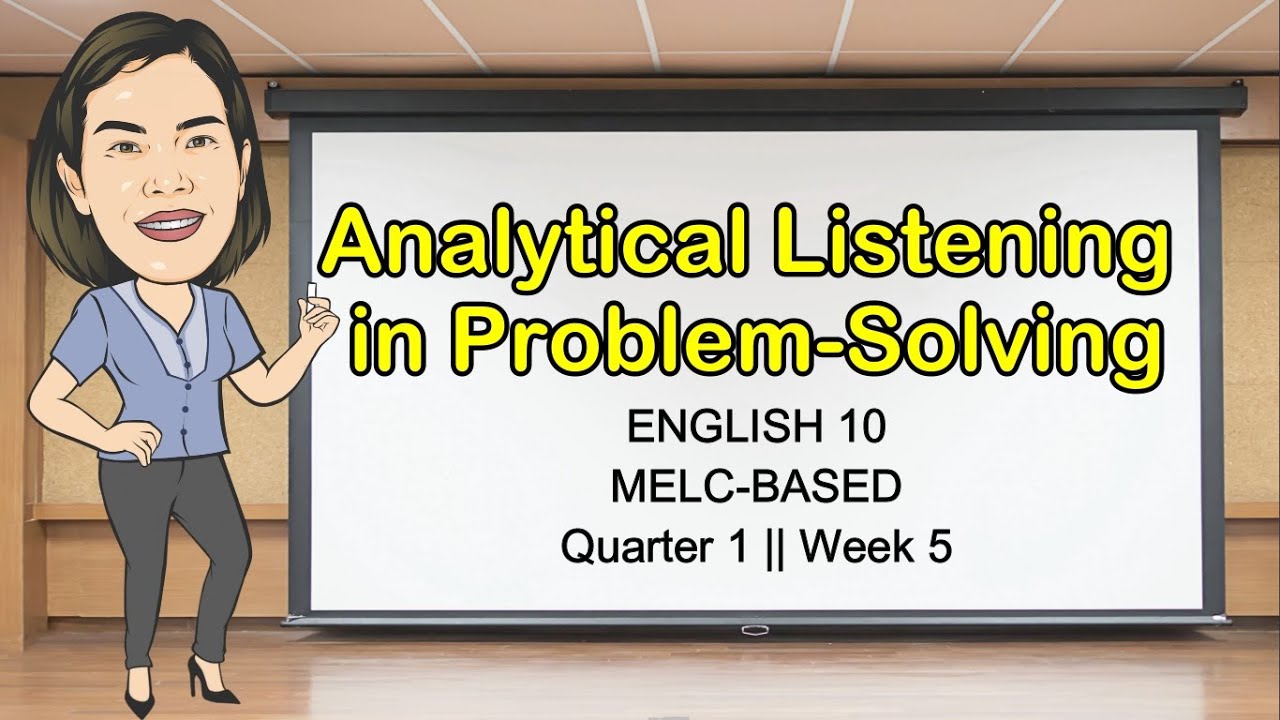Analytical Listening in Problem Solving || GRADE 10|| MELC-based VIDEO LESSON | QUARTER 1| MODULE 5
Summary
TLDRThis English learning video focuses on 'analytical listening,' a critical skill for problem-solving. It distinguishes analytical listening from other types like appreciative, emphatic, and comprehensive listening. The lesson outlines the listening process and emphasizes the importance of active engagement, critical evaluation, and responding effectively. A video clip is used to test listeners' analytical skills, challenging them to evaluate logical reasoning and speaker arguments. The video concludes with a discussion on resolving conflicts through effective communication, urging viewers to practice analytical listening to improve their understanding and problem-solving abilities.
Takeaways
- 🎧 Analytical listening is a crucial skill that involves actively evaluating spoken messages to solve problems or make informed judgments.
- 👂 Listening is an active process that includes receiving, understanding, evaluating, remembering, and responding to spoken and sometimes unspoken messages.
- 🎵 There are different types of listening, including appreciative, emphatic, and comprehensive or active listening, each with its own purpose and approach.
- 🧠 Analytical listening, also known as critical listening, evaluates messages for logic, accuracy, and reasonableness, and is essential for decision-making and problem-solving.
- 🔍 It challenges the speaker's message by assessing its validity and encourages the listener to make judgments based on the evaluation of the speaker's arguments.
- 🤝 Conflict is a normal part of life, and the video provides four steps to resolve conflicts: stop, watch your words, listen up, and find a solution.
- 🚫 When in conflict, it's important to stop before reacting, recognize emotions, and refrain from using hurtful words or blaming others.
- 🗣️ Listening actively to understand the other person's perspective is key to resolving conflicts and finding solutions.
- 🤔 Critical thinking is integral to analytical listening, involving steps like collecting information, asking questions, and analyzing solutions.
- 👨🏫 The video uses a relatable example to illustrate the application of analytical listening in resolving everyday conflicts, making it accessible to a wide audience.
Q & A
What is the main focus of the video script?
-The main focus of the video script is to teach the concept of analytical listening and how it can be used to solve problems effectively.
What are the five stages of the listening process mentioned in the script?
-The five stages of the listening process are receiving, understanding, evaluating, remembering, and responding.
What is appreciative listening and why is it important?
-Appreciative listening is listening for pleasure and enjoyment, such as when listening to music or a comedy routine. It is important because it allows us to engage with and enjoy various forms of entertainment and art.
How does empathetic listening differ from analytical listening?
-Empathetic listening focuses on providing emotional support and understanding the feelings of the speaker without judgment, whereas analytical listening evaluates the message for logical reasoning and accuracy.
What is the purpose of comprehensive or active listening?
-The purpose of comprehensive or active listening is to understand the message of a speaker accurately, which includes interpreting both verbal and nonverbal cues.
How does analytical listening contribute to problem-solving?
-Analytical listening contributes to problem-solving by evaluating the message for logical reasoning, challenging the speaker's message, and using critical thinking skills to assess the accuracy and meaningfulness of the information.
What are the four steps recommended in the video to resolve conflicts?
-The four steps recommended to resolve conflicts are: 1) Stop before reacting, 2) Watch your words, 3) Listen up, and 4) Finding a solution.
Why is it important to 'stop' when faced with a disagreement according to the video?
-Stopping before reacting is important to prevent escalating the conflict and to allow time for recognizing emotions and thinking about the situation before responding.
How does the video script address the issue of using hurtful words during conflicts?
-The video script advises to use nice words and a calm voice, avoiding putting the other person down, and not using mean comments or blame, as these can lead to the situation worsening.
What role does active listening play in resolving conflicts as per the video?
-Active listening plays a crucial role in resolving conflicts by allowing individuals to understand the other person's perspective, which helps in finding a solution that addresses the underlying issues.
How does the video script suggest finding a solution to conflicts?
-The video script suggests finding a solution by working together, discussing the problem calmly, taking turns to speak, compromising, and ensuring everyone is okay with the solution.
Outlines

This section is available to paid users only. Please upgrade to access this part.
Upgrade NowMindmap

This section is available to paid users only. Please upgrade to access this part.
Upgrade NowKeywords

This section is available to paid users only. Please upgrade to access this part.
Upgrade NowHighlights

This section is available to paid users only. Please upgrade to access this part.
Upgrade NowTranscripts

This section is available to paid users only. Please upgrade to access this part.
Upgrade NowBrowse More Related Video

EMPLOYING ANALYTICAL LISTENING IN PROBLEM SOLVING || Quarter 1 Week 5 || English 10 || MELC-Based

STEM Education: "Empowering the Next Generation"

30 Minutes with 30 Dialogues to Improve English at Workplace | Business English Conversation

MODEL PEMBELAJARAN - SKB GURU

Characteristics of Critical Thinkers

Salah Kaprah Pengajaran Matematika di Indonesia
5.0 / 5 (0 votes)